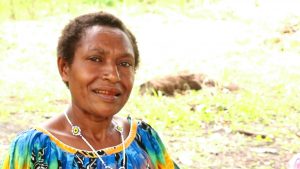A remote elementary school in Morobe Province has celebrated the completion of a new classroom which is providing a safe learning space for local children.
The classroom at Ngariawang 2 Elementary School was the result of a successfully implemented School Learning Improvement Plan (SLIP), which was led by staff and the school board of management with support from parents and the nearby community.
he project was initiated following training to improve the planning capacity of teachers and boards of management, which was delivered by World Vision as part of the Together for Education (T4E) program.
The T4E program is supported by the Papua New Guinea-Australia Partnership and improves teacher performance, creates more inclusive learning environment, and strengthens the capacity of parents to support children’s learning.
It provides professional development for teachers, provides contemporary learning resources for schools and works with stakeholders to strengthen school governance.
Teacher-in-charge Yanik Kwanean has been teaching at Ngariawang for eight years and is currently the only teacher at the school. She took part in school management training along with board of management chairman Michael Kupik and board member Paul Magan.

During the training, the three learned to create and execute SLIPs and identified a permanent classroom as the highest priority. Ms. Kwanean said they have proved community support can transform a school and contribute immensely to a child’s education.
“Me and the community representatives have the knowledge” Ms. Kwanean said.
“With the help of our community we have built this new permanent classroom. I am very thankful for that.”
The Ngariawang 2 community is nearly three hours by road from Lae and until now the school has operated from bush material classrooms built by the villagers since its establishment in 2012.
With no road access to transport building materials to the school, the local community built a one-kilometre road using spades and hoes.
Mr. Kupik said that the school management training helped foster more engagement and the community has made it their business to ensure kids can attend school and get the knowledge they need to succeed in life.
“The T4E intervention have transformed the school and also the community,” he said.
“Our community has completely changed its mindset and is helping us to bring about necessary change to the community and the school.”
Mr. Magan said the community have now made plans to build another classroom and build water supply into the village and the school.
“After the SLIP training, we are confident we can achieve all these plans we have and we are working together towards it,” he said. Ngariawang 2 elementary is one of 109 schools supported by the T4E program in Morobe Province.
The program also gave Yanik Kwanean the opportunity to undertake three teacher trainings, which she said have significantly improved students’ literacy and numeracy skills.
“My students can read and do math’s without much help, which was not the case in the past,” Ms. Kwanean said.
“This is mainly because I now understand the concept of multi-grade teaching,” Ms. Kwanean said.
The T4E Project is supported by the PNGAusPartnership and implemented by World Vision, ChildFund and Library For All.
It is part of Papua New Guinea and Australia’s broader education and leadership partnership and a key contributor in supporting the National Department of Education’s priority of improving girls and boys early grade literacy and numeracy.

